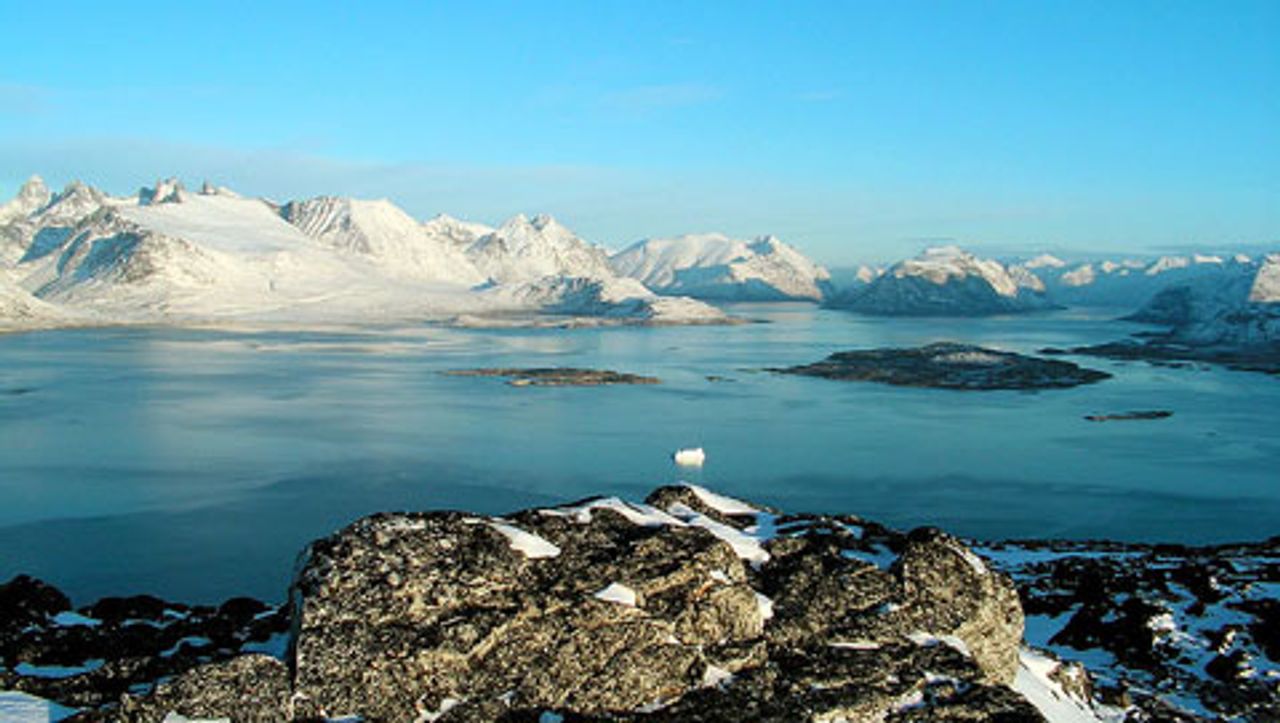Arctic sea ice extent dropped to the lowest level ever recorded, bottoming out at 3.41 million square kilometres (1.31 million square miles) on September 16, according to the National Snow and Ice Data Center (NSIDC). That is 49 percent below the average minimum recorded during the 1980s and 1990s.
“Things are developing much faster than any scientific model has predicted,” said Dr. Morton Rasch, director of the monitoring programme of the Greenland ecosystem at the University of Aarhus in Denmark.
 A fjord in Greenland
A fjord in GreenlandWhile these troubling statements tend to frighten most people, international investors are already rubbing their hands. The largest ice melt in the recent history of mankind means gaining access to a part of the world that was previously closed to them.
The Arctic region, once known as the “Eternal Ice”, contains huge fishing grounds and 20 percent of the world’s estimated oil and gas reserves. In addition, huge deposits of rare earths, copper, silver and gold are suspected.
Global warming has already led to a continual improvement of conditions for the exploitation of these previously untouched areas. Higher temperatures now make it possible to start work two weeks earlier in spring and end two weeks later in fall. The prospect of waterways being ice-free by the end of this decade promises to radically reduce hitherto high transport costs.
A look at Greenland shows how avidly investors are jumping at these unexpected opportunities. In 2010, there was only one single drilling site in the country. Today, more than 100 exploratory drillings are being carried out by several different companies, including NUNAOIL, DONG Energy, Chevron, ExxonMobil, Husky Energy and Cairn Energy.
None of these companies have the oversight necessary that would prevent another ecological disaster on par with the BP spill in 2010. This is in spite of the fact that the maritime area is covered with ice for six months of the year and an unexpected oil spill would be impossible to fight from October to May.
There would also be no chance of collecting any oil on the inaccessible coasts of Greenland, and the spilt oil itself would evaporate infinitely more slowly than, for example, in the Gulf of Mexico. That is why the municipal readiness chief in the region issued a warning in 2010. “If something happens,” he stated, “we would be lost. We could do nothing but watch.”
Unaffected by environmental concerns, international investors are currently focussing on a very different problem. China, which in contrast to Russia, the US and some European states, does not own any Arctic territory, has for some time been developing its activity in the region.
Chinese delegations have visited Denmark, Sweden and Iceland this year offering initial contracts. China has been investing in drilling sites in Greenland, and its representatives have proposed to bring in their own workers for the development of new oil and gas fields, because Greenland, covering an area of more than 2 million square kilometres, has a population of fewer than 57,000. China is particularly interested in the extraction of rare earths, needed for the production of high technology products.
In response to Chinese operations, Antonio Tajani, a vice president of the European Union, travelled to the Greenlandic capital of Nuuk in June and offered several hundred million euros in “development aid” in order to prevent the Greenland government from granting Chinese companies exclusive rights to Greenland commodities. In order to emphasize the offer, European Commission president Juan Manuel Barroso received Greenland’s prime minister, Kuupik Kleist, in Brussels.
The European Union, Japan and South Korea have already applied for permanent observer status on the Arctic Council. The institution was founded in 1996 as an exclusive forum of the Arctic coastal states. China followed suit this summer and demanded a place in the body that is rapidly gaining in importance. “We have grown from a mere forum to a decision-making body,” said the current president of the council, the Swedish Arctic ambassador, Gustav Lind.
Geostrategic considerations also play a major role in the current race for the Arctic. The coastal states and NATO are already building up military capability in the region. The US, whose military owns the world’s northernmost airbase in the Greenlandic town of Thule, is watching developments very closely. Melting Arctic snow will open up seaways via the polar route for China in the near future and thus provide the US’s biggest trade rival with new opportunities, both economically and militarily.
The dramatic acceleration of the melting snow in the Arctic has within a very short time released formidable forces of capitalism. The hunt for profits and geostrategic advantages is in full swing, and the logic of capitalist competition will not only lead to the ruining of one of the natural wonders of the world, but might possibly end in military conflict and ecological disasters, with catastrophic consequences for humanity.
